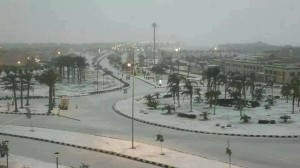redo Jump to...
print Print...

Cairo: Egyptians woke up to find snow on the streets for the first time in more than a century.
(by Laura King and Batsheva Sobelman, Chicago Tribune) CAIRO — Snow coated domes and minarets Friday as a record Middle East storm compounded the suffering of Syrian refugees, sent the Israeli army scrambling to dig out stranded motorists and gave Egyptians a rare glimpse of snow in their capital.
Nearly three feet of snow closed roads in and out of Jerusalem, which is set in high hills, and thousands in and around the city were left without power. Israeli soldiers and police rescued hundreds trapped in their cars by snow and ice. In the West Bank, the branches of olive trees groaned under the weight of snow.
In Cairo, where local news reports said the last recorded snowfall was more than 100 years ago, children in outlying districts capered in white-covered streets, and adults marveled at the sight, tweeting pictures of snow-dusted parks and squares. In other parts of the city, rain and hail rocketed down.
 On social media, some joked that the snowfall was the mystical work of Gen. Abdel Fattah Sisi, the military strongman who is the focus of something of a cult of personality among his followers. Sisi led the coup five months ago against the highly unpopular but democratically elected Islamist president, Mohamed Morsi.
On social media, some joked that the snowfall was the mystical work of Gen. Abdel Fattah Sisi, the military strongman who is the focus of something of a cult of personality among his followers. Sisi led the coup five months ago against the highly unpopular but democratically elected Islamist president, Mohamed Morsi.
Storm-driven waves lashed Egypt’s Mediterranean coast, and fishermen in the ancient port city of Alexandria were warned by authorities against putting out to sea. [Several inches of snow fell in the Sinai Peninsula, usually an arid desert region, while authorities were forced to close the port in the coastal city of Alexandria – which saw relatively light snowfall – after a third consecutive day of bad weather and high winds.] Sleet washed the dusty fronds of desert palm trees.
The inclement weather worsened the situation for tens of thousands of Syrian refugees in Lebanon, where many live in makeshift camps, abandoned buildings and other temporary sites lacking heat and protection from the elements. [In Lebanon’s Bekaa Valley – where there are an estimated one million Syrian refugees are crowded into 250 camps – many refugees were digging out snow from their provisional shelters amid subfreezing conditions. Relief agencies handed out warm clothing, blankets, bedding, heating equipment in refugee camps as snow fell relentlessly for the second day running.]

The situation is likely worse for multitudes of displaced people inside rebel-held and contested areas of Syria, where clashes and blockades by both sides in the country’s civil war have severely hampered delivery of aid.
In Israel, where the storm was described as the heaviest December snowfall since 1953, thick clouds temporarily closed Ben-Gurion International Airport, causing the diversion of two international flights to Cyprus. Jerusalem’s mayor, Nir Barkat, likened the storm to a snow tsunami.
From chicagotribune.com and London’s Daily Telegraph. Reprinted here for educational purposes only. May not be reproduced on other websites without permission from The Chicago Tribune.
Questions
1. When did Cairo, Egypt last have snow?
2. a) How much snow fell around Jerusalem?
b) When was the last time Israel got such a heavy snowfall?
3. How did the snowfall in Israel affect residents there?
4. a) How much snow fell in the Sinai Peninsula?
b) What type of climate does the Sinai Peninsula have?
5. a) How many Syrian refugees are living in Lebanon’s Bekaa Valley?
b) Why is the snowfall such a hardship for the refugees?
6. Why is the snowfall most likely an even greater hardship for Syrians displaced inside Syria?
Daily “Answers” emails are provided for Daily News Articles, Tuesday’s World Events and Friday’s News Quiz.



